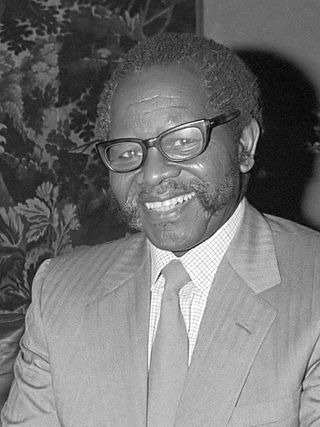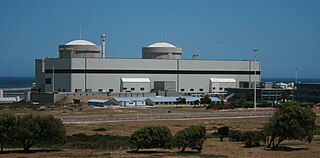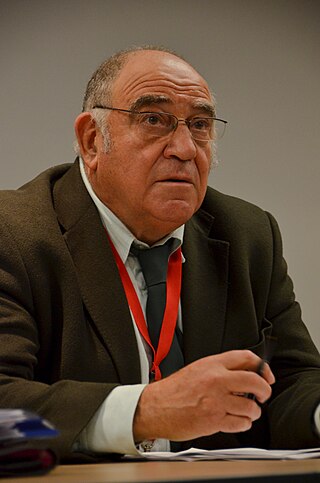
Oliver Reginald Kaizana Tambo was a South African anti-apartheid politician and activist who served as President of the African National Congress (ANC) from 1967 to 1991.

Koeberg nuclear power station is a nuclear power station in South Africa. It is currently the only one on the entire African continent. It is located 30 km north of Cape Town, near Melkbosstrand on the west coast of South Africa. Koeberg is owned and operated by the country's only national electricity supplier, Eskom.
Joe Slovo was a South African politician, and an opponent of the apartheid system. A Marxist-Leninist, he was a long-time leader and theorist in the South African Communist Party (SACP), a leading member of the African National Congress (ANC), and a commander of the ANC's military wing Umkhonto we Sizwe (MK).
Dieter Felix Gerhardt is a former commodore in the South African Navy and commander of the strategic Simon's Town naval dockyard. He was arrested by the FBI in New York City in 1983 following information obtained from a Soviet defector. He was convicted of high treason as a spy for the Soviets for a period of twenty years in South Africa together with his second wife, Ruth, who had acted as his courier. Both were released prior to the change of government following the 1994 general election.

Ronald Kasrils is a South African politician, Marxist revolutionary, guerrilla and military commander. He was Minister for Intelligence Services from 27 April 2004 to 25 September 2008. He was a member of the National Executive Committee (NEC) of the African National Congress (ANC) from 1987 to 2007 as well as a member of the Central Committee of the South African Communist Party (SACP) from December 1986 to 2007.

Sathyandranath Ragunanan "Mac" Maharaj is a retired South African politician affiliated with the African National Congress, academic and businessman of Indian origin. He was the official spokesperson of the former President of South Africa, Jacob Zuma.

The apartheid system in South Africa was ended through a series of bilateral and multi-party negotiations between 1990 and 1993. The negotiations culminated in the passage of a new interim Constitution in 1993, a precursor to the Constitution of 1996; and in South Africa's first non-racial elections in 1994, won by the African National Congress (ANC) liberation movement.

Vortex is a 1991 war novel by Larry Bond and Patrick Larkin. Set during the final years of apartheid in South Africa, Vortex follows the assassination of a reformist National Party president and his cabinet by the African National Congress, as well as a subsequent seizure of power by far-right Afrikaners. The plot unfolds through a series of intertwining accounts narrated through several characters. It was a commercial success, receiving generally positive reviews.

The environmental movement in South Africa traces its history from the early beginnings of conservation, to the rise of radicalism and activism amongst local ecologists. Before the Chernobyl disaster and the fall of the Berlin Wall, there were very few green activist groups in the country. Koeberg Alert and the Dolphin Action and Protection Group are probably two of the oldest post-conservation groups.
Marion Monica Sparg is a South African activist, former guerrilla and public administrator.

Overlanding or 4WD Touring is self-reliant overland travel to remote destinations where the journey is the principal goal. Typically, but not exclusively, it is accomplished with mechanized off-road capable transport where the principal form of lodging is camping, often lasting for extended lengths of time and spanning international boundaries.
The Trans Karoo Express, or simply Trans Karoo, was a South African express passenger train service which travelled an approximately 1,600-kilometre (990 mi) journey between Johannesburg and Cape Town. It operated daily in each direction, meaning that there were in fact two Trans Karoos - they passed each other during the night, heading in opposite directions. The service was operated by Spoornet, the national railway company.

The African National Congress (ANC) has been the governing party of the Republic of South Africa since 1994. The ANC was founded on 8 January 1912 in Bloemfontein and is the oldest liberation movement in Africa.
Linda Mvusi is an actress and architect. Mvusi took an award for best actress at the 1988 Cannes Film Festival for her role in the film A World Apart which was directed by Chris Menges. Mvusi was the first South African to get a best Actress award at Cannes. Mvusi also shared in an award for excellence for her architecture on the Apartheid Museum.

Timothy Peter Jenkin is a South African writer, former anti-apartheid activist and political prisoner. He is best known for his 1979 escape from Pretoria Local Prison, along with Stephen Lee and Alex Moumbaris.

Olivia Anne Marie Forsyth , agent number RS407 and codename "Lara", is a former spy for the apartheid government in South Africa. Having attained the rank of lieutenant in the Security Branch of the South African Police (SAP), Forsyth defected to the African National Congress (ANC) and was incarcerated at Quatro prison camp in northern Angola. Following her escape, Forsyth spent six months hiding in the British embassy in Luanda.
Renfrew Leslie Christie is a South African scholar and member of the Anti-Apartheid Movement whose covert operations for uMkhonto we Sizwe, the paramilitary wing of the African National Congress, provided intelligence that made possible the 1982 bombing of the Koeberg Nuclear Power Station. Christie was arrested, tortured, and sentenced to 10 years in prison under the Terrorism Act, 1967 for giving information on the nuclear programme of South Africa to the ANC. His actions were intended to thwart the Apartheid regime of South Africa and weapons of mass destruction, specifically the government's clandestine nuclear arsenal. His work delayed the development of Apartheid South Africa's nuclear weapon programme by several years.

The Security Branch of the South African Police, established in 1947 as the Special Branch, was the security police apparatus of the apartheid state in South Africa. From the 1960s to the 1980s, it was one of the three main state entities responsible for intelligence gathering, the others being the Bureau for State Security and the Military Intelligence division of the South African Defence Force. In 1987, at its peak, the Security Branch accounted for only thirteen percent of police personnel, but it wielded great influence as the "elite" service of the police.

Operation Vula was a secret domestic programme of the African National Congress (ANC) during the final years of apartheid in South Africa. Initiated in 1986 at the ANC headquarters in Lusaka and launched in South Africa in 1988, its operatives infiltrated weapons and banned ANC leaders into the country, in order to establish an underground network linking domestic activist structures with the ANC in exile. It was responsible for facilitating the only direct line of communication between ANC headquarters and Nelson Mandela, who at the time was imprisoned and was discussing a negotiated settlement with the government on the ANC's behalf. The operation was disbanded in 1990, after its existence had been publicly revealed and eight of its leaders charged under the Internal Security Act with terrorism and plotting an armed insurrection.

Moe Shaik, also spelled Mo Shaik, is a South African civil servant, diplomat, businessman, and former intelligence operative who has been the South African High Commissioner to Canada since 2022. He is a former chief of the National Intelligence Co-ordinating Committee and a former director of the foreign intelligence wing of the State Security Agency, at that time still called the South African Secret Service.













